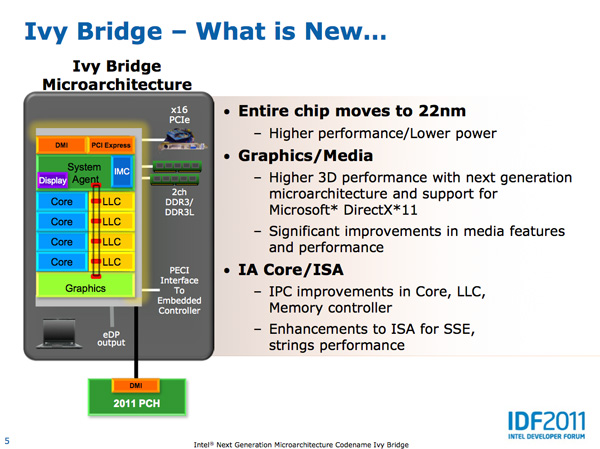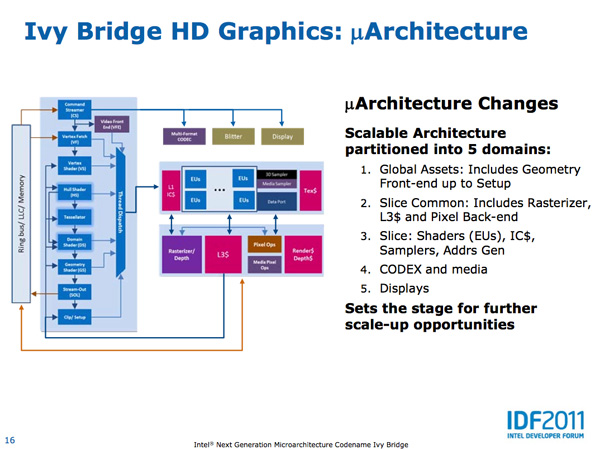The Ivy Bridge Preview: Core i7 3770K Tested
by Anand Lal Shimpi on March 6, 2012 8:16 PM EST- Posted in
- CPUs
- Intel
- Core i7
- Ivy Bridge
Ivy Bridge Architecture Recap
At IDF Intel disclosed much of Ivy's CPU architecture, but below is a quick summary:
- 4-wide front end with µOp cache from Sandy Bridge
- OoO execution engine from Sandy Bridge
- Data structures previously statically shared between threads can now be dynamically shared (e.g. DSB queue), improves single threaded performance
- FP/integer divider delivers 2x throughput compared to Sandy Bridge
- MOV instructions no longer occupy an execution port, potential for improved ILP when MOVs are present
- Power gated DDR3 interface
- DDR3L support
- Max supported DDR3 frequency is now 2800MHz (up from 2133MHz), memory speed can be moved in 200MHz increments
- Lower system agent voltage options, lower voltages at intermediate turbo frequencies, power aware interrupt routing
- Power efficiency improvements related to 22nm
- Configurable TDP
I've highlighted the three big items from a CPU performance standpoint. Much of the gains you'll see will come from those areas coupled with more aggressive turbo frequencies.


On the GPU, the improvements are more significant. Some of the major changes are below:
- DirectX 11 Support
- More execution units (16 vs 12) for GT2 graphics (Intel HD 4000)
- 2x MADs per clock
- EUs can now co-issue more operations
- GPU specific on-die L3 cache
- Faster QuickSync performance
- Lower power consumption due to 22nm






















195 Comments
View All Comments
sabot00 - Tuesday, March 6, 2012 - link
How long will Intel keep its HD Graphics increases?MonkeyPaw - Tuesday, March 6, 2012 - link
I don't understand the logic of selling a high end CPU with the best IGP. Seems like anyone running an it isn't going to stick with the IGP for games, and if they aren't gaming, then what good is that high-end GPU? Maybe the entire "Core i" line should use the HD 4000.Flunk - Tuesday, March 6, 2012 - link
Because the low end chips are just die-harvested high end chips it makes sense. No reason to disable it so they leave it on.And some people do actually use high end processors with IGPs. It's fairly easy to get one from a major OEM. It's stupid but most people don't know any better.
aahkam - Tuesday, March 27, 2012 - link
Funny comments I saw.What's wrong even if the High End CPU that comes with IGP?
Is High End CPU = Gaming Machine CPU? If that is your logic, you're a rich but shallow boy!
I do lots of Video Editing and Transcoding, I need High End CPU but None of the High End GPU beats Quick Sync in Transcoding in terms of Quality and Speed.
dqniel - Friday, April 6, 2012 - link
"and if they aren't gaming, then what good is that high-end GPU?"I feel like you missed that part. He's not saying that only gamers use high-end CPUs. He's saying that gamers using a high-end CPU won't care about the high-end iGPU because they won't use it. Also, non-gamers who need a high-end CPU generally won't see the benefits of the included high-end iGPU. So, he proposes that the better niche for the high-end iGPU would be on the more affordable CPUs, because then budget-minded gamers could buy an affordable CPU that has a relatively powerful iGPU integrated into it.
defter - Wednesday, March 7, 2012 - link
This is a mid-range CPU, not high-end one.High desktop CPUs (i7 3800-3900) don't have IGP.
KoolAidMan1 - Wednesday, March 7, 2012 - link
It is because laptops continue to get slimmer and slimmer. Getting good GPU performance without the compromises on the chassis that a dedicated GPU would force is the point.Tormeh - Wednesday, March 7, 2012 - link
This.My next laptop will have processor graphics for the sake of battery life and size, and whoever has the best graphics gets my money.
bznotins - Wednesday, March 7, 2012 - link
Seconded.aguilpa1 - Wednesday, March 7, 2012 - link
If the 4000HD is on the level of lets say a 560m I would not hesitate to get a laptop with no dedicated graphics but if it isn't I'm still going to go for the dedicated.